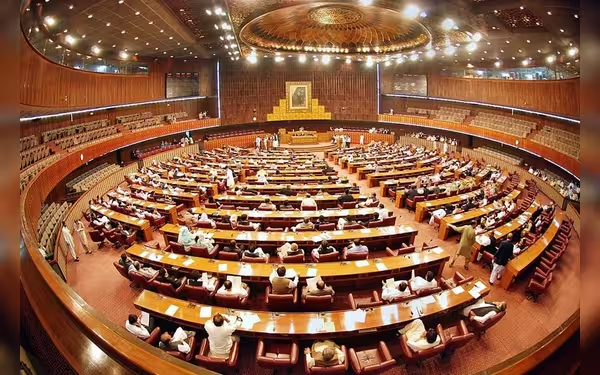Thursday, November 7, 2024 07:34 AM
Pakistan Parliament Approves Supreme Court Expansion and Military Tenure Bills
- Parliament passes bills on Supreme Court expansion.
- Military chiefs' tenures extended amid opposition protests.
- Judicial reforms aim to address case backlog.
 Image Credits: tribune.com.pk
Image Credits: tribune.com.pkPakistan's Parliament passes key bills for Supreme Court expansion and military chiefs' tenure extension amid ongoing political challenges.
In a significant move that has stirred both support and opposition, the Parliament of Pakistan has passed crucial bills aimed at expanding the Supreme Court and extending the tenures of military chiefs. This legislative action comes at a time when the country is grappling with various challenges, including political instability and judicial backlog. The amendments, presented by Defence Minister Khawaja Asif, specifically target the Pakistan Army, Navy, and Air Force Acts, and were approved by a majority vote despite intense protests from opposition members.
The proposed changes to the military acts are seen as a way to ensure continuity and stability within the armed forces. The Defence Minister emphasized the importance of these amendments in maintaining national security and operational readiness. However, the opposition has raised concerns about the implications of extending military chiefs' tenures, arguing that it undermines democratic principles and accountability.
In addition to the military amendments, Law Minister Azam Nazeer Tarar introduced proposals to increase the number of judges in the Supreme Court and the Islamabad High Court. This move is aimed at addressing the growing backlog of cases and ensuring timely justice for citizens. The approval of these proposals by the House reflects a recognition of the pressing need for judicial reform in Pakistan.
As the Parliament moves forward with these changes, it is essential to consider the broader implications for Pakistan's governance and legal framework. While the expansion of the judiciary may provide relief to an overburdened system, the extension of military tenures raises questions about the balance of power between civilian authorities and the military. It is crucial for lawmakers to engage in open dialogue and consider the long-term effects of these decisions on the democratic fabric of the nation.
The passage of these key bills marks a pivotal moment in Pakistan's legislative history. As the country navigates through complex political waters, the decisions made today will undoubtedly shape the future of governance and justice in Pakistan. It is imperative for all stakeholders, including the government, opposition, and civil society, to work collaboratively towards a more transparent and accountable system that serves the best interests of the people.













